20th Bratislava IFF Pays Tribute to Women and Robert Redford
The 20th Bratislava International Film Festival 2018 Starts Today: COME, SEE, EXPERIENCE!
Bratislava International Film Festival Inspires and Helps

Marián Mitaš
Marián Mitaš is an actor, puppeteer and host. He was born in Považská Bystrica in 1980. In 2006 he graduated from the Department of Puppetry of the Academy of Performing Arts in Bratislava. After graduating, he began working in the Dezorz Puppet Theatre, the only puppet theatre for adults in Slovakia. Besides that, he works as a DJ and host in Radio FM and performs at the P. O. Hviezdoslav Municipal Theatre in Bratislava. His debut in film came with an episodic role in Michael Haneke’s Time of the Wolf (Le temps du loup, 2003) followed by parts in the films Visible World (Viditeľný svet, 2009, d. Peter Krištúfek), The House (Dom, 2010, d. Zuzana Liová), Candidate (Kandidát, 2013, d. Jonáš Karásek), Home Care (Domácí péče, 2015, d. Slávek Horák), Milada (2017, d. David Mrnka), The Zookeeper’s Wife (2017, d. Niki Caro). After the drama Toman (2018, d. Ondřej Trojan), we will see him in the spring of 2019 in Teodor Kuhn’s By a Sharp Knife (Ostrým nožom) and in the adaptation of Simon Mawer’s book The Glass Room (Skleněný pokoj, d. Julius Ševčík).
Mitaš’s audience also know him from the TV series Doctor’s Office In The Rose Garden, City of the Shadows, Homicide Old Town, The Sentenced, Dr. Ludsky, Wild Wine, Secret Lives, Inspector Max, Dads or Mistresses.
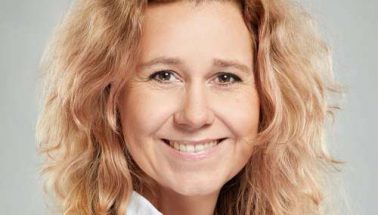
Markéta Pášmová
Markéta Pášmová graduated from the Philosophical Faculty of Masaryk University in Brno. In 1999, she began working as a program organizer at Zlín Film Festival. In 2004, she began working at Zlín Film Festival as head of the program department. Since January 2013 she has been the artistic director. She is focused on European cinema and is active in the field of educational programs for children and youth. She sits regularly in professional juries of similarly oriented festivals. She is a board member of the foundation FILMTALENT ZLÍN, which supports talented young filmmakers and she is a board member of European Children’s Film Association. Markéta Pášmová is the head film programme organizer of the festival, comprehensively covering its dramaturgical composition and line. She develops and maintains domestic and international relations in the realm of film professionals.
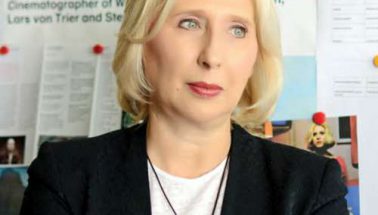
Gena Teodosievska
Gena Teodosievska is a journalist, film critic, festival selector and FIPRESCI member. She was born in 1962 in Veles, Republic of Macedonia. Since 1991 she has been employed within the PSB Macedonian Radio and Television as a journalist, film critic, and editor in chief of the Cultural programme of the Macedonian TV. She has University degrees in Journalism and Media and Communications and a Master degree in Cultural studies. In 2001 she produced experimental feature film The Judge (Sudijata) screened at the Official programme at the Venice Film Festival and 37 other international Film and Video festivals. While promoting the new visual moments of combining TV and film art she produced 23 short documentary and experimental films with different filmmakers, promoting Macedonian film production all over the world. In 2008 she became festival selector at the Manaki Brothers ICFF. In 2016-2018 she served as an Artistic Director of the same festival, and this year she is appointed as a Festival Director of the Manaki Brothers ICFF.
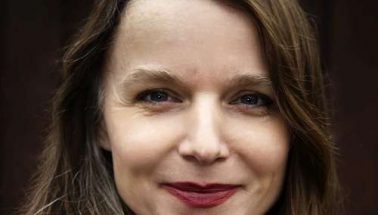
Bettina Hirsch
Bettina Hirsch is a well-established freelance film and theatre critic, jury member at various national and international film festivals, as well as a radio editor and host. She writes regular reviews for “screenmagazin.com”, a German independent film and TV online magazine, and is chief editor of MondayMovieTalk at Alexradio, Berlin. As film advisor she consults schools across Berlin and is currently working on a new radio program on films for young audiences.

Viera Langerová
She studied film and theatre theory at the Academy of Performing Arts in Bratislava, postgradual Cultural Studies on Charles University in Prague and intercultural communication at Business School in Tallinn (Estonia). She worked as an editor in film and theatre periodicals such as Film and Theatre, Dialogue or Slovak Views. She delivered lectures on film at Baltic Film and Media School and the Tallinn University in Estonia, on theatre anthropology at the Academy of Performing Arts in Bratislava, and is currently lecturing at FAMU in Prague.
For ten years she lived in Asia and devotes herself to Asian film. She is the author of the book Film Geography: Continental China, Hong Kong and Taiwan (2010) and the travelogue Urdu, Parda, Burka. Five years in Pakistan (Lidové noviny, 2011). She works as a film curator and participated in Focus on Kazakh Cinema (1999) and Focus on Kurdish Film (2012) for the Karlovy Vary IFF. She is the programmer of the section Neighbours Online at Art Film Fest in Košice.
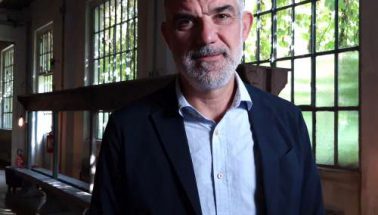
Michele Sancisi
Michele Sancisi is a member of SNCCI (Union of Italian Film Critics). He was born in Rimini in 1963. After graduating at DAMS (Department of Art Music and Show) of Bologna University he moved to Milan. He worked in the editorial office of the first Italian Pay-Tv Tele+ (1991-2004). For many years he wrote for the newspaper Il Messeggero, then for magazines such as Jam; Donna Moderna; Annuario del cinema italiano; FilmTv, and he was editor of the magazine Bealux.
He has published books about cinema and theatre biographies: Nik Novecento (2009); Walter Chiari, a stage animal (2011) awarded Efebo Prize for the best cinema book of 2011; contribution in the book anthology Milano, città e spettacolo (2011) by Antonio Calbi; Marcello Marchesi, Il genio senza tempo (2012); Le canzoni di Totò (2013); Panta Agenda Marchesi about Marcello Marchesi (2015); Tutto su Mariangela (2018), biography of the actress Mariangela Melato and was a producer of the documentary Nanni 70 (2009, d. Simone Del Vecchio). His most important realization was Animania, a serie of 8 documentaries about the masters of the Italian animation cinema.
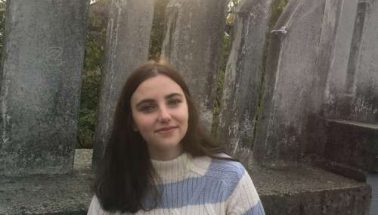
Dominika Jarečná
Dominika Jarečná was born in 1999 in Bratislava. Since 2018 she has been studying at The Department of the History of Art at Masaryk University in Brno (Czech Republic). She was a member of the Giornate degli Autori jury at the Venice IFF 2018 and is an ambassador of the LUX Prize for the years 2018-2019.
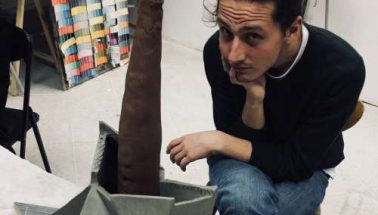
Jakub Kňažko
Jakub Kňažko is interested in a broader scope of visual arts. His studies at the Faculty of Art of the Pedagogical University of Cracow deepened his interest in photography and composition. Film is one of his favourite things, especially if he digs deeper under its surface. He is currently studying and creating at the Faculty of Mass Media Communication in Trnava.
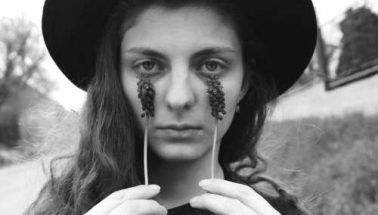
Gabriela Tuchyňová
Gabriela Tuchyňová was born in 1996 in Košice. Ever since childhood, she’s had an active relationship with literature and theatre, but film stood on an untouchable pedestal. That’s why she decided to go down the path of filmmaking. After completing her bachelor studies in directing and screenwriting of feature and documentary film at Tomas Bata University in Zlín, she continues to study directing of feature films at the Academy of Performing Arts in Bratislava.
The Clitoris
Animated documentary film about the only human organ that has no other function than bringing pleasure.
The Queen
Documentary film about 11 years old Memi, who is preparing for her role of Carnival queen in Argentina. Never-ending changing of clothes, putting on make-up, the crown, which is too heavy and making parents’ dreams come true.
Layer
Funny and tough mockument about a man, who lays eggs.
Morning of Butterflies
Diana is an ordinary woman who, in the thirteenth week of pregnancy, realises that her baby has been dead for two weeks. The next ten days she waits for the nature to deal with it. The documentary Morning of Butterflies is a story of what it was like for Diana to accept death, contradict doctors, and trust her own body.
Gawking Red
Gawking Red documents the personal experience of the Red light district in Amsterdam summarizing thoughts and feelings about the biggest tourist attraction. It’s quite a divide between the polished Western European culture, aesthetic and nature and the weird underworld of the Red light district – occupied mostly by tourists and foreign sex workers from Eastern Europe, Africa and the Caribbean.
Normal Appearances
The participants of the American reality shows The Bachelor and Bachelor in Paradise caught in the moments when they’re nervously fixing and tweaking their appearance to look their best in front of the cameras.
Part-time Job: Mother
The feature-length documentary film by Eva Štefankovičová was created at the turn of the ‘80s and ‘90s, and thus at the turn of two social establishments. It talks about the status of women in the then society, compiled from current statements of women from different social strata. They talk about the social security of women-mothers, the problems of lonely mothers and the ideas about the position of women in a newly-formed society.
At Eternity’s Gate
Biographical drama film about the final years of painter Vincent van Gogh’s life.
Today, van Gogh is recognized as one of the greatest and most influential artists in history, but his prickly personality and mental illness prevented him from being accepted by his contemporaries in the art world of the late 1800s.
Van Gogh, financially supported by his loving brother Theo, lives and works in the village of Arles, joined for a time by another famous painter Paul Gauguin.
Although At Eternity’s Gate’s screenplay is inspired by true events, the film is not a strict biopic. It is a journey inside the world and mind of a person who, despite skepticism, ridicule and illness, created some of the world’s most beloved and stunning works of art.
Willem Dafoe’s magnificent performance captures every bit of the artist’s complexity. With stunning visuals and a judicious balance of poetry and drama, Schnabel draws us into both van Gogh’s genius and his tortured life.
The film had premiere in the main competition of this year’s Venice film festival and Willem Dafoe got the award for the best actor.
Sofia
A story of a 20-year-old Moroccan women who lives with her parents in Casablanca and her desperate search for the father of her unborn child to avoid being reported to the authorities. The story opens with Sophia, who is unaware she is pregnant until she goes into labour. Her cousin, Lena, a medical student understands what is happening to Sophia and takes her to the hospital. In a race against time, the hospital grants the young woman 24 hours to provide the documentation of her child’s father before alerting the police. Together with her cousin, Sophia tries to locate the young man she only met once.
This film looks at a young woman facing the mores and laws of a country that seems more interested in surface propriety than citizens’ actual well-being.
A portrait of a country’s complex relationship to its own values, laws and taboos.
Both lead actresses are exceptionally well cast and camera movements are finely calibrated to every tonal shift.
Suleiman Mountain
Karabas is a man who has never really grown up. He is a difficult man: a hard-gambling, hard-drinking, child-in-a-man’s body who puts only himself first in his family He and his young pregnant wife just scrape by. When his first wife Zhipara arrives with the news that she’s found their long-lost son Uluk, a question arises: Could the fractured foursome all live together?
Soon the new family dynamics are stretched past their limits, and Karabas is caught between his old ways and the two women bearing his sons: one re-born and one yet to come. Now this unusual family must decide if they are to co-exist or tear each other apart as old wounds are ripped open and deception becomes the rule of the day. Some wounds are just too hard to heal – even if you believe in the magical power of Suleiman Mountain.
Shot on location in and around the mystic World Heritage Site of the Suleiman Mountain in Osh, Kyrgyzstan, film tells the coming of age story of a grown man who must first lose love in order to find it.
In her distinctive debut, Elizaveta Stishova dexterously combines a road movie with a family drama with elements of an original comedy. She organically incorporates traditional Kyrgyz customs, shamanic practices, and folklore motifs into the storyline, thereby painting a vivid portrait of life in this Central Asian country.
Blind Spot
The film is a story about the grey zones in mental illness; blind spots hard to discover, as experienced by a mother realizing her daughter is struggling with far worse issues then she had first thought. The leading roles in Tuva Novotny’s directorial debut are played by the renowned Norwegian actors Pia Tjelta and Anders Baasmo Christiansen. This moving drama, filmed in a one take lasting the entire 98 minutes, addresses mental health issues among Norwegian youth.
The film follows a mother struggling to understand the crisis her daughter is going through, as it affects the entire family. How can we as adults, parents, and society help our children and youth open up about difficult thoughts and mental suffering, when our ideals are built on the pursuit of happiness and excess?
One of the keys to this heart-breaking tale is defence. And the fact that sometimes, however we try to protect ourselves, it is impossible for our defence mechanisms not to be breached.
Carmen & Lola
Carmen & Lola is a story of a romantic relationship between two gypsy teenage girls who are tread upon by society for both their heritage and sexual orientation.
Carmen lives in a gypsy community in the suburbs of Madrid. Like every other woman she has ever met, she is destined to live a life that is repeated generation after generation: getting married and raising as many children as possible. But one day she meets Lola, an uncommon gypsy who dreams about going to university, draws bird graffiti and likes girls. Carmen quickly develops a complicity with Lola and they discover a world that, inevitably, leads them to be rejected by their families.
Being a lesbian and a gypsy means being different and, at the same time, a minority. It’s a lethal pairing. Being a woman is also a struggle. Being a woman and gypsy means you are entrenched in a culture of centuries of patriarchy and chauvinism. Being a woman, gypsy, and a lesbian is a lethal combination.
Cutterhead
Rie, a female PR coordinator dealing with a promotion of what seems to be a perfect example of intra-European collaboration, delves deep into the yard to interview some of the champions of this wonder. She’s visiting a tunnel boring machine on the Copenhagen worksite of a new metro line to portray the well-oiled European cooperation in the Metro construction when an accident suddenly occurs. Inside the massive tunnel borer, they find themselves trapped in a hellish airlock, facing an ever-dwindling oxygen supply. Unable to escape, she takes refuge in an airlock with Croatian miner Ivo and Bhran, a worker from Eritrea. Suddenly, what already seemed like a confined space turns into a real prison. They find themselves having to share more than they ever thought possible: water, air, anguish and madness, hoping to be saved from what seems to be a very dangerous fire.
They put their lives and bodies in each other’s hands to survive the heat, pressure and mud in the claustrophobic cutterhead, exposing their radically different world views and forcing them to reconsider their lives – before finally being rescued.
Cutterhead is also a relevant statement on the issue of migrant workers.
Crystal Swan
Twenty-two-year-old Evelina, also known as Velya, is a law school grad who enjoys living in her native Minsk, Belarus. However, Velya’s real passions are music and travel and her dream is to go to the USA and live as a DJ.
In order to get a visa, she must prove she has a steady job — which is easier said than done in the middle of an economic crisis. The country is struggling with unemployment and people are being paid in kind. As Velya searches for work, her friends and family are trying to convince her to stay in Minsk (“A person should live in her motherland”), but she remains adamant about leaving. “Nothing will ever change here,” she explains.
In 1990s post-Soviet Belarus, her dream is more realistic than it has ever been before. When filling in a US visa application, Velya uses a random phone number, only to discover that the consulate plans to ring it. Velya finds herself in a small factory town, where she has to wait by the phone of a family she’s never met before. As her zest for freedom clashes with the small-town mentality of sticking to your own, Velya’s own vitality risks being dulled.
The film premiered at this year’s Karlovy Vary competition section East of the West. and will be the Belarusian entry for the Academy Awards.
Blossom Valley
A story of young lovers on the run, of their desire for freedom and place in the sun. It’s an unusual love story as there is no indication they ever become physical lovers.
Bianka (20) finds herself drifting in the suburbs without any particular purpose. She has a sudden urge to steal a baby, which she does, but now she has to find a father and a home. When none of her ex-boyfriends are willing to lend a hand, the only one happy to help is Laci (21) who is mentally disabled and living in a workers’ hostel. While Bianka sees this whole situation as little less than an exciting role play, Laci develops feelings for her and will do whatever it takes to ensure a happy family life.
King Skate
King Skate is a film that oozes life. The history of skateboarding in Czechoslovakia is a story of a small, everyday revolt against the totalitarian regime. Šimon Šafránek shows us the 70s and 80s era as not always rendered in history books. Its handmade skateboard gave young people a sense of freedom and made them „rockstars” of the streets, but in some cases even world champions in this non-traditional sport.
The director’s rich experience with music video and documentary production is almost tangible in King Skate. Its period soundtrack combines dozens of domestic as well as foreign artists. Moreover, the amount of authentic amateur archive material gives the film a unique historical value.
Talks with TGM
It’s the autumn of 1928 and the book of conversations between Karel Čapek and Tomáš Garrigue Masaryk is finally complete. Čapek, the writer, tries to locate the president in Topoľčianky castle gardens to offer him part of the royalty for the book, which is to come out on the occasion of the tenth anniversary of the republic. The president, however, is not in the mood, as his daughter is strongly against its publishing. As a result, another conversation between the two begins.
The revived history is based on quotes from the book and mutual correspondence. The film dialogue deals with the world and politics while capturing both protagonists’ characters. In the words of the director himself, the film deals with “the fact that emotions can sometimes be more powerful than ideas, even with such exceptional people“.
The Other Side of Everything
In the parental home of the director Mila Turajlić, there is a door, which has been locked for the past 70 years. After 1945, the spacious apartment was ”forcibly” split by an ordinary key and even after the regime changed, no one turned the key again. Since the director’s ancestors were unusually politically active, the apartment is haunted by the history of the 20th century – and now, in times of great turmoil in the streets, the demonstrations behind its windows can determine Serbia‘s direction in the 21st century.
At these doors and with an occasional glimpse from the window, the filmmaker begins an intimate conversation with her mother Srbijanka Turajlić, a retired professor and prominent political activist against the regime of Slobodan Milosević. The film is a dialogue between two generations, disclosing much about the country’s past and present, about family history and political regimes, about an individual‘s responsibility over the country’s political direction, about Serbia, Yugoslavia and Europe.
Extraction
A metaphorical reflection of social detachment through participatory method unveils a relationship between a young Ukrainian girl Elizaveta and her mother, a dentist. A brave analogy of an extracted tooth, a social requisite and spiritual immaculateness commences an on-screen clash of alienating details and an intimite tableu of family life.
Journey
Journey is the story of a man, who daydreams entering the minds of people around him, stealing their dreams, desires and personal experience in order to fill his own, empty mind.
Therapy by Travelling
The documentary is a personal story of young Michal about his mental illness. Michal has anxiety, depression and agoraphobia. Agoraphobia is a strong fear of moving away from home. The only way to get rid of fear is to face fear. The desire to travel and to live a normal life without limitation is a motivation to travel around Slovakia on his beloved motorcycle.
Vampire Sushi
Grandmother is walking home from supermarket with very heavy bags full of groceries. Fortunately she meets young gentleman, who is willing to help her.
The Trip
A couple leaves for a trip to the mountains. Surrounded by a beautiful nature, their truth or dare game turns to a fight for life. Psycho-thriller inspired by a short story by Jozef Karika.
José
José (19 years old) lives with his Mother (50s) in Guatemala City – a typical lower-class existence in one of the world’s most dangerous, religious, and impoverished countries. She never had a husband, and José is her youngest and favourite child. Her life is her church, and selling sandwiches at a bus stop. José spends his days on cramped buses and heavy traffic as he runs food to waiting drivers. Aloof and resigned to things as they are, he fills his free moments playing with his phone and random sex arranged on street corners and dating apps. When he meets Luis, a migrant from the rural Caribbean coast, they pursue an unexpected relationship and José is thrust into passion and pain and self-reflection that was previously unimaginable.
Made with nonprofessional actors, this is a film about love, loss and queer desire lived in the shadows of a culture defined by crime, violence, macho attitudes, strict religious beliefs and binding family ties.
Guatemala is one of the world’s most dangerous, religious, impoverished and socially conservative countries – and with the youngest population in all the Americas it’s edge-poised for change; it sets a particular dramatic context to the story.
Putin’s Witnesses
On December 31, 1999, Boris Yeltsin announced his resignation as President of the Russian Federation and appointed Vladimir Putin as his successor. Vitaly Mansky was given the task to shoot a made to order film about Putin, and so began a series of interviews with the new president. His position of “official” documentarist gave him a today unimaginable access to Putin, but also to Yeltsin (and after years of silence, Mikhail Gorbachev reappears). Mansky took full advantage of his position and wasn’t afraid to ask even unpleasant question.
Eighteen years later, Mansky cut the material, creating a fascinating portrait of a politic on the rise, a documentary political thriller about three men sharing one country and millions of silent witnesses standing by and watching.
Girl
Film about a girl, born in the body of a boy, who dreams of becoming a ballerina.
15-year-old Lara has always known that she was born in the wrong body. Having attended mandatory counselling sessions and taking puberty inhibitors for some time, she impatiently waits for the day when she can have the surgery she so desperately wants. She has a strong support system at home, thanks to her progressive single father and loving young brother. But, she still faces great stress at the prestigious dance Academy she attends, where the increasing physical and emotional pressures slowly take their toll. Featuring a truly remarkable central performance from acting and dancing talent Victor Polster in his first screen role, Lukas Dhont’s richly empathetic and beautifully realized film sensitively explores Lara’s complex inner emotions.
The film is multiple award winner at this year’s Cannes festival– including the Camera d’Or for best debut film, the Queer Palm and the Un Certain Regard Best Actor award and FIPRESCI Prize.
Styx
Rike – 40, a doctor from Europe – embodies a typical Western model of happiness and success. She is educated, confident, determined and committed. We see Rike‘s everyday life, as an emergency doctor, before she fulfils a long-held dream and sails out to sea alone in her sailing boat. Her goal: Ascension Island in the Atlantic Ocean.
The beginning of Rike’s journey is very silent and meditative; there is only her and the vastness of the ocean. It is utterly captivating to watch her take command over her boat and enjoy the solitude, an occasional dip in the dark blue waters and the glorious sunsets.
But her dream holiday is quickly broken off on the high seas. One crisp morning, after a big storm, Rike spots an old fishing boat, overloaded with around hundred people. She quickly realises that the boat, which is full of immigrants from Africa, is sinking and she immediately calls for help. But the coast guard seems hesitant to assist, instructing her to stay away. Rike finds herself in a difficult situation and she is not sure what to do…
Wolfgang Fischer’s film depicts a struggle for survival at sea which makes palpable the cruelty of the situation for people in dire straits whose fate is determined by others. The ocean becomes the scene of an allegorical, existential drama.
Styx is a remarkable film that uses minimal dialogue to tell a very powerful story.
Breaking News
One day in two separate newsrooms. The day when Miloš Zeman, the sitting Czech president, plans to announce if he intends to run for re-election. However, only to his closest supporters at a meeting where journalists are denied access. As Czech Television, the public broadcaster, wants to spread the news as soon as possible, their day is all about how to obtain the information as well as about the logistics and technical processes of getting the breaking news out. Meanwhile, the economic daily Hospodářské noviny needs to prepare the next day’s issue so as to swiftly incorporate the important news during the night.
In this day and age when the media are facing strong criticism, the film is an interesting contribution to the debate on the work of journalists. Exposing the backstage of editorial offices, decision-making processes, routine work as well as everyday interviews, Breaking News is a political thriller without any conspiracy, based solely on observation.
Domestique
Roman is a top athlete, who yearns for individual success. So far, however, he has always been in the position of a domestique, a bicycle racer who sacrifices for the team. Now he is recovering from an injury and it seems that strenuous training and strict diet are not enough. Roman decides to install an oxygen tent in his apartment. His wife, Charlotte, is not too happy about this. She has been longing for a baby for quite some time now. Both begin to dwindle in their obsessions and slowly transform their bodies. Every day their relationship changes. Domestique is a claustrophobic drama and horror of the body.
Winter Flies
At a police station, the 14-year-old Mára is being interrogated. The boy was caught at the steering wheel hundreds of miles away from his home. Together with his friend, 12-year-old Heduš, they had embarked on an adventurous road trip. They enchant a young girl hitchhiker and enjoy freedom, but only until the police catch them. However, the interrogators are starting to suspect that Mára might just be making things up. Winter Flies is a teenage comedy for a festival audience, a story of two outsiders, coming of age and ties of friendship.
Pause
Pause is a film about the power of mental violence in marriage. Middle-aged Elpina is imprisoned in a relationship full of routine. Her husband is by far not interested in taking her needs or living out into account – he is the one making money and “supports” her. However, Elpina is not able to leave him and that is why she escapes into fantasy imagining she has strength for shouting it all out.
This chamber drama with only a few characters is mostly set in one apartment. Outside, the crisis and unemployment make it even more difficult for Elpida to become independent. Dampening expression and powerful acting create film with a cloudy atmosphere that at least for a short time conveys the experience of a mentally abused woman.
Barefoot in the Kitchen
Barefoot in the Kitchen summarises the history of female characters within the Spanish cinema. The montage documentary draws from hundreds of films from the 1930s to the present showing, how both the political and social situation has influenced the depiction of women on the silver screen. The interwar period was the time of emancipation, during dictatorship the films emphasised the rather “traditional” position of women, later on came their sexualisation. The history of Spanish film women is the history of Spain and its ideology.
Mimi & Líza: Christmas Lights Mystery
Mimi sees the world with her hands and ears. She is blind. Together with her best friend Líza, they have visited many fantastic worlds of fun and mystery. Christmas is finally coming. Mimi, Líza and their neighbours decorate a beautiful magnificent tree. However, the bulbs won’t light up. Where did the magic Christmas light disappear? Did it flee? Or did someone steal it? Maybe it’s the doings of their suspicious neighbour Viliam, who has no friends. The answer is hidden in the times when their neighbours were still small children. Mimi and Líza set out on an adventurous journey to bring the charming Christmas light back.
Mimi & Líza: Christmas Lights Mystery is a compilation of a new eponymous story of Mimi and Líza in form of a 26-minute TV special and 6 serial episodes (1.Twins from the Cards, 2. The Grand Worm Tour, 3. Agent Vitamin, 4. The Mirror, 5. The Letters on the Run, 6. The Entchanted Time).
Beau travail
The mysterious story from the environment of the French legions is one of the pinnacles of Claire Denis and Agnès Godard’s production. This free adaptation of Herman Melville’s final novel Billy Bud, Sailor, centres around Galoup (Denis Lavant), who is tasked to train a troop of young soldiers. However, he is sure one of them shouldn’t be there. The story is fragmented, the training in the desert almost dreamlike and the film has a tinge of ancient tragedy. Denis and Godard are turning the “traditional” view of a military unit around, the most prominent evidence of which is the shots of training. A female gaze at a male body.
Knife + Heart
Knife + Heart is a beautiful, gentle, atmospheric thriller with a criminal plot set in the porn industry. Yann Gonzalez, last year’s winner of our short films competition, plays with the codes of the ‘70s genre cinematography, creating a special metafilm. It stars Vanessa Paradis as a gay porn director Anne, a strong woman who follows her mind, but she is broken-hearted because her lover (and editor) Loïs has left her. She decides to win her back by creating her most ambitious project. Staff members are being brutally murdered and Anna incorporates the investigation into her movie.
Gonzalez’s feeling is close to the poetry of Bertrand Mandic, who also plays one of the characters. The music is composed by the indie-electronic M83 with the director’s brother as front man.
Rafiki
Rafiki depicts Africa in a way the western world doesn’t often see it: with its urban character, full of colours, music, and happiness. Even though it deals with some complicated topics. Rafiki is a story of two young women from Kenya who fall in love and of course, the conservative environment they’re part of, does not support this kind of relationship. It a story about first love in a country where LGBT+ rights are still denied.
Wanuri Kahiu works with the traditional culture of the region and transforms it into the modern world. The film is full of pastel colours, songs, sometimes it reminds of a musical. Regardless of various obstacles, it depicts the happiness and celebration of life in Nairobi.
Rafiki is the first Kenyan feature film to be introduced in Cannes Film Festival as part of the Official Un Certain Regard selection.
Beautiful Things
A film essay about capitalism which turns into a song. Van works on an oil field, Danilo is an engineer on a big cargo ship, Andrea is a scientist studying the noise and Vito works in a landfill. These four men participate in the cycle of making beautiful things – from their creation to transport and marketing to disposal. The film is full of beautiful deserted spaces and silence. It is the exact opposite of what we’re used to. Although the protagonists are part of the production process, their work environment predestines them to be lonely and isolated.
★
A sky full of stars is a flat projection of the three-dimensional world – just like film. And since the film stock hasn’t been able to capture the starry sky until recently, whenever it appeared in a film, it was an artwork, a certain idea of the sky. The relationship between the cinema and the sky, the notion of how we imagine the world outside and how we relate to it is explored by Johann Lurf in his found footage film ★. He used images from more than 550 films and put them in chronological order creating his own history of the cinema (with the promise of films being regularly updated). We can see how the artistic styles have changed over the decades, and the different ways of human thinking, we can see how cultures differ and how they relate to the infinity and the unknown. We can see how the image and aspect ratio changed, the film technology and techniques, or music – all the images in the movie have the original score or voice-overs. And since the segments that have been edited out last from several frames to dozens of seconds, the film creates a unique sound collage. ★ is a conceptual work and meditation about art and humanity.
The End of Fear
A multi-layered film about contemporary art and the murder of a painting is based on the event which happened in 1986 in the Amsterdam museum Stedelijk: a man, who stabbed a famous painting called Who’s Afraid of Red, Yellow and Blue III by the icon of the abstract expressionism, Barnett Newman. Was he trying to destroy the contemporary art? The real death of this piece of art came after the failed restoration, destroying it for good.
The visual artist Barbara Visser follows this case and uncovers our complicated relationship towards the contemporary art. The film questions the character of the art, the uniqueness of the piece and its economic, artistic and social value.
“I Do Not Care If We Go Down in History as Barbarians”
Radu Jude reopens the unpleasant questions about our history that we prefer to forget. This time, he focused on the Romanian share in holocaust and war crimes during World War II. The story follows a young activist and artist Mariana and her endeavour to create a big play about a forgotten massacre caused by the Romanian army in 1941. She has to deal with the unwillingness of the actors and authorities who try to undermine her authority due to various reasons.
Jude’s adamant way of talking and long dialogues create a story about Arendt’s Banality of Evil – with regard to our actions, to our relationship towards the history, and to our tendency not to burden our conscience.
The Old Man & the Gun
A film inspired by the real story of Forrest Tucker who has escaped from the prison 18 times, brings fresh air to the traditional American genre about lonely criminals. Since the age of 15, Tucker spent a big part of his life behind the bars. Now, when he is 70 years old, he could finally enjoy freedom and retirement, but it seems he cannot resist the temptation to organize another bank robbery. He forms a group of criminals, hoping to make use of their wit.
Tucker is portrayed by Robert Redford, returning to his older acting roles, skilfully using his image of the symbol of masculinity.
Widows
When the police shoots four armed criminals during the attempted robbery of a big pile of money, they leave almost nothing behind. Only their widows who are left with the frightening debts held by the unpleasant creditors. And it’s these debts, anger and grieve that connects the lonely women. They realize that if they stick together, they can do anything. They turn out to be a very capable storm troop, ready to take control of their own destiny.
Slovak and Czech Films at Bratislava IFF
Bratislava IFF – 20 Years of Discovering New Talent
Fiction Competition
Focusing the limelight on new talent within the industry that may well be the future stars of world cinema – the traditional international competition of first and second fiction features is rooted in our festival’s ambition to discover fledgling filmmakers at the beginning of their careers and give them space on a prestigious international stage. Our selection always strives to present a balanced mixture of remarkably mature and youthfully radical films, which adumbrate the rise of exceptional talent that is worth keeping track of.
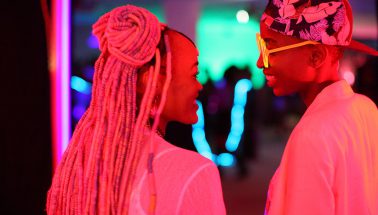
Cinema Now
Pressing issues seen from the global perspective and interpreted by the most vocal authors of contemporary cinema – that is Cinema Now, a section that presents an instant overview of the most remarkable films of the season. Some of them have already created a furore at world’s most prestigious film festivals while others still wait to be discovered. The section puts promising newcomers next to established filmmakers and doyens of the industry.
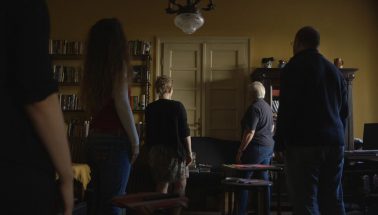
LUX Prize
Cinema is one of the most powerful cultural ‘vehicles’. It reminds us of people, places, events and moments in our lives. It moves and inspires us. It enriches the debate and even provokes it. It is a source of emotions; it also provides reflections on us and our identity. Most European films are only released in the country where they have been made and are rarely distributed across borders. The contrast is even bigger when we realise that more than 60 % of films released in European cinemas are European, but they are only watched by one third of the cinema audiences. In order to remedy this, the European Parliament created the LUX FILM PRIZE in 2007.
The prize pursues two main goals: to popularise original European film production in EU member states and to attract public attention to the European Union. Motion pictures produced in any EU member state as well as in Norway, Liechtenstein, Switzerland or Iceland are eligible to take part in the annual competition. The selection panel, comprising renowned European film professionals, selects three finalists and the films are then projected in the EP. The winning picture is voted on by all members of the EP, subsequently subtitled in 24 official EU languages and released in all 28 EU member states. Thanks to the LUX PRIZE, European cinema audiences had the possibility to see high-quality movies such as Lorna’s Silence, Shun Li and the Poet, The Broken Circle Breakdown, Ida, Mustang, Toni Erdmann, or Sami Blood which won the award last year.
Since 2012 these films have been screened as part of the Bratislava International Film Festival and its cooperation with the Information Office of the European Parliament in Slovakia. The audience will see three out of ten films from the official selection, which were nominated for the 2018 LUX Prize: Girl, The Other Side of Everything and Styx.
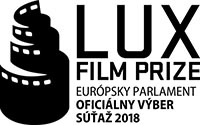

Lexicon: Female Gaze
What is the female gaze? Is there any such thing in cinema?
In 1975 the British film theorist and director Laura Mulvey published a major essay called Visual Pleasure and Narrative Cinema. Her text talked about an asymmetry of power in cinema, which is dominated by the male gaze and the pleasure of a male heterosexual viewer. This dominance is then taken over by the viewer, as it’s prevalent. Mulvey points out how man is in the film the one who watches (the subject), and woman the one who is exposed to that look (object), and continues by asking, whether there’s something like a female gaze.
For women in the film industry, the year 2018 has been quite turbulent. The American cinematographer Rachel Morrison made the history as the first woman, who in the 90-year history of the American Academy Awards received a Best Cinematography nomination for the film Mudbound. The #MeToo and Time’s Up movements have been consistently highlighting the imbalance between men and women at the most prominent positions in film and drawing out examples of violence against actresses and women filmmakers during decades of their work in the film industry. Large TV studios have been publicly condemned for the gender pay gap, or the fact that male actors get paid a lot more in relation to their female colleagues.
This year the Lexicon section will try to take a closer look at this topic, explain its extent and different ways of interpretation. The aim of this section is to offer the viewer at least a partial sense of what female gaze is and, at the same time, to initiate a discussion about what all it could actually be.
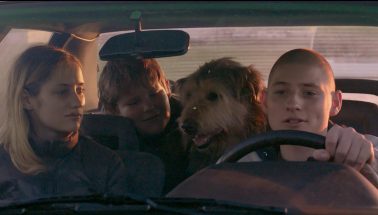
Made in CZ/SK
In the past few decades, international film co-productions have become a characteristic feature of the European cinema. Thanks to them, especially smaller countries are able to realize even projects that are financially and technically more demanding. For example, the European Cinema Support Fund of the Council of Europe has, of now, supported 48 co-production projects with Slovak production companies being a majority or minority co-producer. The Slovak Audiovisual Fund has also contributed significantly by creating a sub-programme for the support of minority co-productions.
Without co-production cooperation, Slovak cinematography would be deprived both in terms of quantity and quality. The Slovak-Czech co-production, which is the most common here, is a result of both the historical existence of the common state of Czechs and Slovaks, whose 100th anniversary we celebrated this year, and the natural continuation of the filmmaking cooperation between the two neighboring countries after the dissolution of Czechoslovakia. Proof of this cooperation can be seen not only in the interest of the audience and the many awards acquired by these joint projects, but also the section Made in CZ/SK, in which we present several current works also created in the Czech-Slovak co-production.
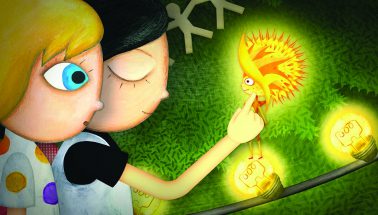
Junior
A programme for the youngest viewers (and their parents).